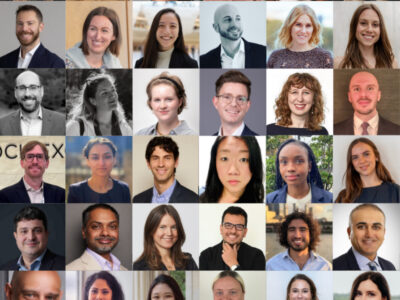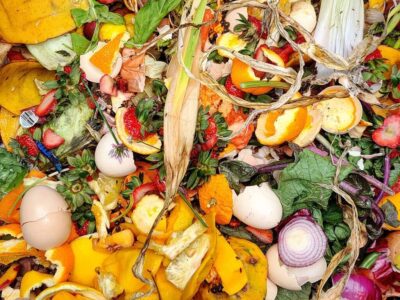
Sustainability Management alum Christy Everett (’15) knows that sustainability is a broad sector involving nearly every field and organization. In 2011 she founded respondé furnishings, a sustainable furniture manufacturer.
She affirms that the Master of Science in Sustainability Management provided opportunities to connect to the industry and better engage with clients. Knowing what her interests were before starting the program allowed her to customize her courses, improving the value and relevance of the MSSM program.
What is your current job and what are the responsibilities associated with your position?
As founder of respondé furnishings, my responsibilities vary from material specification and manufacturing to marketing and brand management. respondé furnishings specializes in contract furniture, working with clients on corporate office and institution projects to retail distributors, such as AllModern.
Do your current job responsibilities align with the professional goals that you originally had when you began the MSSM program?
As an entrepreneur focused on sustainable manufacturing, I joined the MSSM program to obtain a comprehensive understanding of the various facets of sustainability. The program provided opportunities to connect to the industry, participate in industry panel discussions, and better engage with clients.
What inspired you to work in sustainability?
Working in manufacturing made me aware of the numerous chemicals we are exposed to in our interior environments. There are industry efforts to limit VOCs (volatile organic compounds) in the core building, but furniture and office supplies are seldom considered. respondé furnishings provides healthy furniture options, mindfully manufactured for better indoor air quality.
What has been your biggest challenge associated with sustainability (in your current position)?
In the mainstream market, sustainability is seldom a selling feature. Converting a traditional consumer over to seeking sustainable products is extremely difficult. This makes it challenging for sustainable manufacturers to thrive and provides little incentive for traditional manufactures to green their materials and processes. The market will change when mainstream consumers demand sustainable goods.
What has been your biggest accomplishment associated with sustainability (in your current position)?
I have had the privilege of working with a number of various clients on sustainable interior projects. It is rewarding to know that through respondé furnishings I am contributing to create productive workspaces and healthy living spaces. Over the last four years, it has been great to watch a growing awareness of healthy interior environments. The development of scientific data proving the benefits of healthy interiors and the effects of VOCs on cognition has helped to bring awareness to the benefits of safe furnishings.
What skills has the MSSM program taught you that you think have proven useful to your current position?
In addition to improving my analytical and communication skills, developing a comprehensive knowledge of sustainability has been key in creating effective holistic strategies. The diversity of the program provided me a foundation in sustainable energy, production, waste, water, social impacts and climate systems. A solid foundation in these areas equips me to implement effective sustainable initiatives.
What do you like best about the MSSM program and why?
I believe the benefit of the MSSM program is that you can customize the program to your profession and industry by enrolling in courses across Columbia University. I elected to take engineering courses related to manufacturing and business school courses, in addition to the courses in the MSSM program. This flexibility within the program made it appealing and more relevant to my professional interests, and broadened my network of colleagues.
How do you intend to utilize your degree from the MSSM program in furthering your career?
In addition to continuing to work in sustainable manufacturing, my goal is to utilize my degree to educate designers on sustainable materials and production. By creating awareness before product development begins, I hope to improve the sustainability of products and improve their environmental and social impacts.
What tips do you have for your fellow students who are looking for a job in sustainability?
Hone in on an industry and sector. Personally, I greatly benefited from knowing my career is in manufacturing and sustainability. Sustainability is a huge sector involving nearly every field and organization in existence. Knowing whether your interest lie in sustainable finance vs. renewable energy will allow you to customize your courses, improving the value and relevance of this program.
What do you think is the most beneficial aspect of the MSSM program with regard to your career?
This program propels you to the next level in the sustainability industry. Before this program it seems valid to say I was a sustainability enthusiast. Being in the Master of Science in Sustainability Management program initiated my journey of becoming a sustainability professional. It equipped me with comprehensive knowledge in the field of sustainability and has enabled me to speak as an informed professional with current facts of environmental and societal impacts. Additionally, the relationships created while partaking in this program are of immense value, both personally and professionally.
The M.S. in Sustainability Management, co-sponsored by the Earth Institute and Columbia’s School of Professional Studies, trains students to tackle complex and pressing environmental and managerial challenges. The program requires the successful completion of 36 credit points. Those credit points are divided among five comprehensive content areas: integrative sustainability management, economics and quantitative analysis, the physical dimensions of sustainability, the public policy environment of sustainability management, and general and financial management. Visit our website to learn more.



